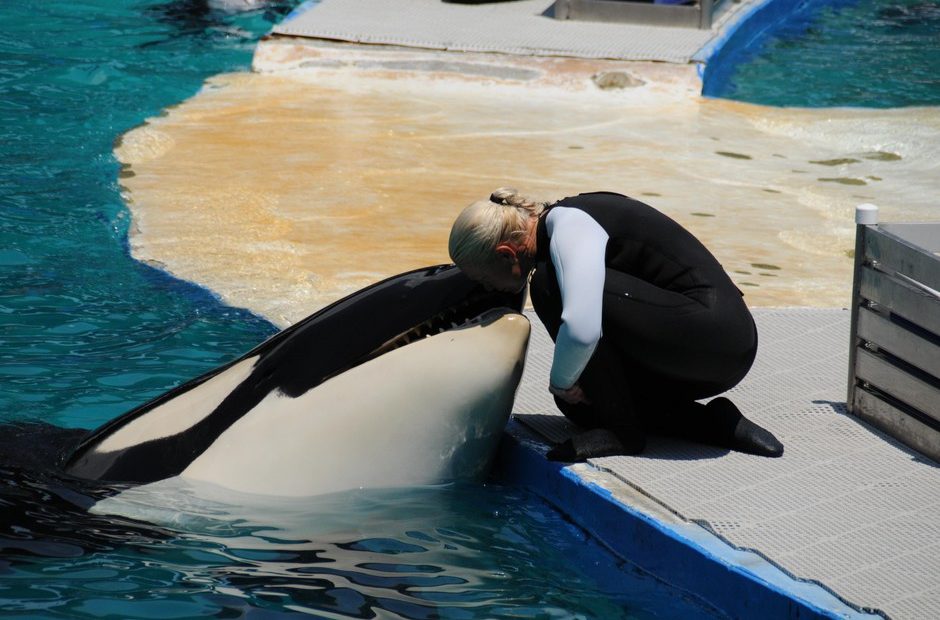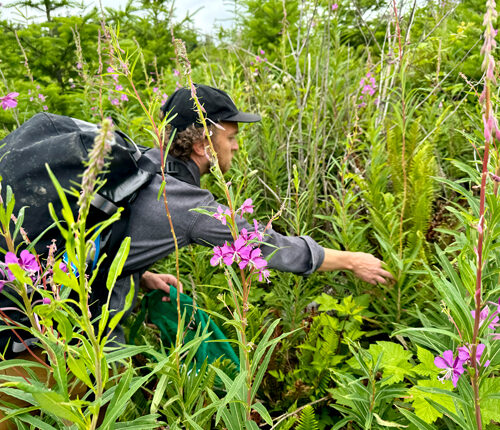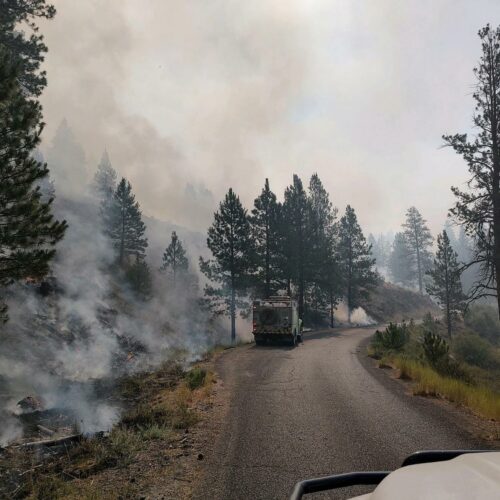
This Orca Was Stolen From Puget Sound. The Lummi Nation Want Her Back
At Penn Cove, on the north end of Whidbey Island, gulls and other birds fly overhead, and a muddy beach leads down to the water.
It’s quiet today, but, in the late 1960s and early 1970s, this was the place whale catchers came to capture orcas. They threw noisemakers into the water to drive pods of orcas into the narrow cove, then blocked the way out and pulled the baby whales out of the water.
Nearly 50 orcas from the Salish Sea’s population were captured this way. Today, only one of those whales is still alive.
She lives at the Miami Seaquarium. They call her ‘Lolita.’ The Lummi call her Tokitae.
The Lummi want her to be released. They’ve carved a totem pole in the shape of an orca and are carting it across the country to demand that the Seaquarium bring her back to Puget Sound for release.
Lummi carver Jewell James designed and carved the totem pole for Tokitae. It’s a horizontal, 16-foot orca with her tail flipped over her back, resting on the backs of two harbor seals.
“Then you see a human figure holding on to the dorsal fin, riding the back of the whale,” James explained. “That’s the whale rider. It’s part of a mythology that’s up and down the West Coast here, where the humans are trying to experience the power of the whale and be accepted by them.”
Now, James is taking this totem pole all the way to Florida.
“For Lummi, all of life is sacred,” James said. “We’re all part of a cosmic song. We believe that we’re not just helping her socially and physically by helping her come home, but we’re helping balance a part of the spiritual atmosphere, the songs of creation.”

Lummi carver Jewell James stands with a totem pole he carved to urge the return of Tokitae the orca to Puget Sound. CREDIT: EILIS O’NEILL
Bringing Tokitae back to Puget Sound would require some logistics.
First, she’d need to get placed in a sling and lifted into a shipping container half-full of ice water. Then, that container would get put on a plane and flown to Bellingham. From there Tokitae would get lifted out of the container and into a net enclosure just off Orcas Island.
The Lummi Nation has promised that if Seaquarium releases Tokitae, they’ll take care of her for as long as necessary.
But the whole thing could be more complicated than it seems.
“Making a major change in its life at this point: you know, we don’t really know how that might affect the animal,” said Brad Hanson, a wildlife biologist at NOAA’s Northwest Fisheries Science Center.
Hanson has spent his life studying orcas. He was involved in the release of Keiko, the whale from the movie “Free Willy,” and also in the return of a lost orca to her family in Canada.
He said Tokitae is too old to breed, but she could still contribute.
“We know that these females as aunties and whatnot do potentially serve a role for helping for calf-raising and babysitting sorts of things,” Hanson said. “But that has to be weighed against some of the other risks.”
Hanson said the biggest risk is disease. Tokitae’s been swimming in seawater from the Atlantic Ocean for decades, so she could potentially bring new pathogens back with her to the Pacific Northwest.
And, Hanson added, the orcas of the Salish Sea are short on food, and Tokitae would be another mouth to feed, creating potential competition with the existing population.
Seaquarium hasn’t offered to release Tokitae.
In a statement, general manager Eric Eimstad said, “It would be reckless and cruel to risk [the whale’s] life by moving her.” He also said the whale will “continue to be an ambassador for her species … from her home at Miami Seaquarium.”
The totem pole trip is aimed at drumming up enough public interest that Seaquarium changes its mind.
“Damage has been done,” James said. “But we don’t accept the idea that it cannot be undone.”
The totem pole will be making stops in Seattle on Thursday, Tacoma on Friday, and Portland on Saturday. Then James will take it through California and west to Florida, where it will be put on display.
Copyright 2018 Earthfix/OPB
Related Stories:

‘Tastes like hard work:’ Inside a foraging hike on the Kitsap Peninsula
Andrew Pogue, co-founder of Fair Isle Brewing in Seattle, reaches for fireweed leaves on a foraging trip. (Credit: Courtney Flatt / NWPB) Listen (Runtime 3:46) Read One craft brewery in

Around the Northwest, hot, dry, windy weather fuels fires
Dry, hot and windy conditions have communities on alert for wildfire danger across the Pacific Northwest. Those conditions propelled fire growth over the weekend, and more of the same weather is expected this week.

In green energy boom, one federal agency made the Yakama Nation an offer they had to refuse
Elaine Harvey, Jeremy Takala, Simone Anter. J.D. Reeves/High Country News Read B. ‘Toastie’ Oaster | High Country News This story was originally published by High Country News. When Yakima Nation leaders
















